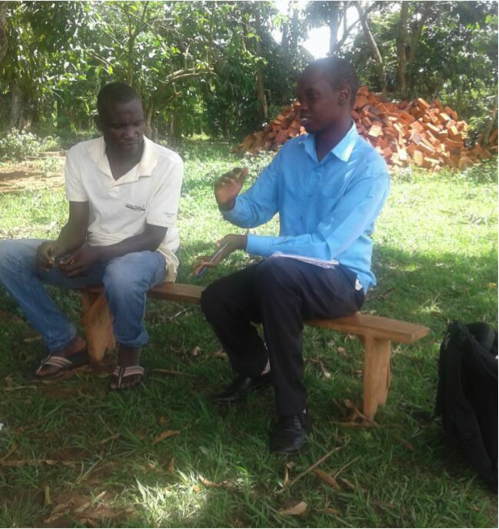On April 5th I traveled to Busede sub-county, which is a few miles from Jinja Town, to join field researcher Julius Kimalyo as he carried out the end line interviews, the final field activity of the FEDU research project.

After a bumpy 20-minute ride on a “boda boda”, I arrived at the Namaganga trading center and we immediately set out to meet some of the study participants. Jema Joseph was one of the respondents we encountered on that day, right when he was taking shelter from the sweltering afternoon heat under a tree adjacent to his home. Jema is a smallholder farmer who concentrates on sugar cane cultivation and piggery.
Jema warmly talked about his experience as a participant in the FEDU project. He asserted that he has gained a lot of new knowledge by participating in the research. The questions posed and simple explanations made him aware of new concepts and services, such as for example MOKASH, a financial product, which enables MTN mobile money customers to save and borrow money using their phones.
As someone engaged in agriculture, he took a specific interest in questions related to agriculture. Since he had to provide information on his finances during each bi-weekly interview, he started documenting expenditures and earnings from agriculture. He hopes to continue keeping track of his agricultural finances even after the research project ends, as he feels it can enable him to make more informed decisions on how to improve output from agriculture.
Interested in related energy questions
Jema disclosed that he was also interested in energy-related questions. Through the leaflet that the researchers handed out on different cookstoves and lighting types, he got introduced to new methods and products which he has not heard of before. The questions on fuel expenses also led him to further scrutinize his expenses.
“You showed us several cooking stoves some were quite modern and good. The stoves I use consume a lot of fuel and are not good for the environment. It made me contemplate on the amount of money I spend on charcoal and firewood. I feel I can reduce this expenditure if I use some of the modern stoves which were showed”. – Jema
When asked if after 6 months his enthusiasm for the study was waning, Jema says that he never grew tired of being part of the research project and he always looked forward to the bi-weekly interviews.
“The whole process did not at any point become boring to me, I always looked forward to the biweekly interviews. Partly because I am always at home but most importantly the interviews gave me an opportunity to take stock of my progress over the two-week period”. – Jema
Gifts
For Jema, the fact that no payment was provided for participating in the study was not a constraint to his participation in the study.
“It will be good if we were given gifts for participating in the research, but it was not a big deal for me. The research seemed useful and I did not take the payment issue as important.” – Jema
He hopes that the data collected will provide a basis for policies to improve on living conditions of either his community or in any other part of the country.
By Simon Yesho
Research Intern

